Canada denies visa to Tunisian LGBT activist

TORONTO, Canada – Prime Minister Justin Trudeau announced on Tuesday that Canada would soon put forward laws to formally protect transgender Canadians from discrimination and violence.
And while the move earned praise from around the world, it comes after Ramy Ayari, a Tunisian human rights and LGBT activist, was recently denied a visa to attend a forum in Montreal to discuss the many challenges Tunisia’s LGBT community faces.
“They wrote me a letter saying they rejected my application because I don’t work, I haven’t travelled and I don’t have a bank account,” said Ayari, 23, about the response he received from Canadian immigration officials.
“Those were the main reasons they rejected my application. There was nothing else,” he told Middle East Eye over the phone from Tunisia on Tuesday.
Ayari founded “Without Restrictions” in 2014, a human rights group that provides support for members of the LGBT community in Tunisia in particular.
“I think it’s very important to work on the international scene. We need support from groups abroad,” Ayari said. “My goal in coming to Canada was to mobilise LGBT groups [there] to work with LGBT groups in Tunisia.”
Application denied
Ayari said he applied for a visa to come to Canada in early April.
He was set to be the keynote speaker at a conference organised by UNESCO at a Montreal university on the human rights situation in Tunisia five years after the country’s revolution.
In early May, when Ayari was preparing to pick up his passport, Canadian officials informed him that his application had been denied, partially due to the fact he did not have a job.
But Ayari said finding a job is not easy in Tunisia in general – about two in five Tunisians under 30 are unemployed – and it is especially difficult for members of the LGBT community.
“Frankly, it’s not logical to ask either an activist or a homosexual why he’s not working in Tunisia. We cannot work, and if we do work, we have to lead a double-life,” he said, explaining that many would have to hide their identities to get a job.
“As activists, we are recognised by the authorities, so it’s very hard to work because when we work it can be in danger. Even if the boss accepts that we work [for him], we can be harassed by people that recognise us.”
Ayari said he also provided Canadian officials with additional paperwork to complete his application, and letters of support from Quebec-based LGBT groups and a member of the Canadian parliament, Helene Laverdiere.
Immigration, Refugees and Citizenship Canada told MEE in an email that it could not comment on specific cases due to privacy concerns.
In general, individuals who apply for temporary residency in Canada must meet several criteria, including proof of familial, work, home or financial ties that will take them back to their home country, said department spokesperson Nancy Caron.
Applicants must also be in good health, have no prior criminal or immigration-related convictions, have enough money for their stay, and be able to convince immigration officials that they will leave Canada at the end of their visit, among other things.
Criminalisation of LGBT youth
Tunisia is home to seven organisations campaigning for the rights and protection of the country’s LGBT community, Ayari said.
Shams, an LGBT rights group, is the first and only organisation to be formally registered with the Tunisian government to defend “sexual and gender minorities”.
But in late December 2015, the group was suspended for one month after its president made comments on gay rights that the state deemed contrary to the group’s stated mission.
“Shams seeks to carry out basic human rights work, such as standing up for LGBT people who have been victims of violence,” said Amna Guellali, Tunisia director at Human Rights Watch, at the time. “This suspension denies them the chance to carry out this important work.”
The suspension was overturned by a court order in February, but LGBT activists continue to face harassment and threats in Tunisia.
Under Article 230 of the country’s penal code, sodomy is a crime punishable by up to three years in prison. Article 226, meanwhile, which broadly outlaws affronts to public decency, has also been used to target transgender Tunisians.
The Tunisian authorities are also known to conduct anal examinations as a way to “prove” homosexuality, a practice that Human Rights Watch said “has no medical or scientific basis and can amount to torture”.
“As activists, we receive threats every day from the police,” Ayari said.
“But we can’t file complaints. What are we going to say? ‘We were attacked because we are gay’? We can’t do that because there is an article that criminalises homosexuals in Tunisia. That’s the big obstacle.”
Canada’s double standard?
In a letter sent to Canadian Immigration Minister John McCallum, a handful of academics and civil society groups in Quebec said Ayari’s visa denial shows evidence of “systemic discrimination” against youth in general and gay youth in particular.
“Are you conscious that the blind application of these economic criteria itself leads to discrimination against vulnerable social groups?” the letter reads.
“LGBT rights activists in Tunisia should have the right, on the contrary, to our admiration for the difficult fight they are leading for equality and dignity. These activists love their country. They actively participated in the Jasmine Revolution and simply want the right to live like all the other citizens in their country.”
Ayari said he hoped Canada would amend its immigration processes to allow LGBT activists to enter the country more easily. He said he hoped to attend the World Social Forum in Montreal in August.
“Canada’s support is very important,” he told MEE.
He added that it was shameful that while he was denied a visa, Tunisian singer Walid Ettounsi will perform in Montreal on 20 May.
Ettounsi made homophobic statements in a debate on Tunisian television earlier this year. “Isn’t it shameful what you’re doing?” Ettounsi asked LGBT rights group Shams’ vice president, Ahmed Ben Amor, on the show.
“He attacked the LGBT community,” Ayari said about Ettounsi. “Frankly, it’s shameful that a homophobe will be singing in Canada.”
HELEM Montreal, an LGBT support group for members of the Lebanese and Arab diaspora communities, also condemned Ettounsi’s scheduled performance, accusing the singer of being responsible for “an unprecedented wave of homophobia in Tunisia”.
“Hateful and intolerant discourse has no place in Canada,” the group said, while calling for a boycott of Ettounsi’s concert.
New MEE newsletter: Jerusalem Dispatch
Sign up to get the latest insights and analysis on Israel-Palestine, alongside Turkey Unpacked and other MEE newsletters
Middle East Eye delivers independent and unrivalled coverage and analysis of the Middle East, North Africa and beyond. To learn more about republishing this content and the associated fees, please fill out this form. More about MEE can be found here.




